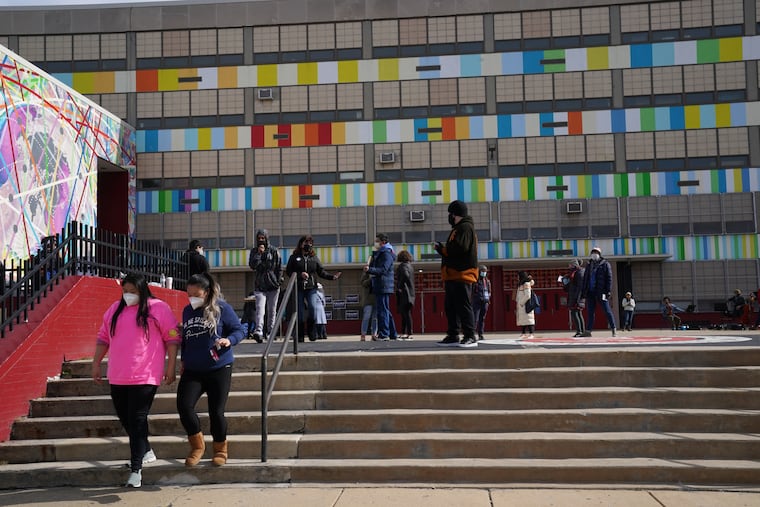Philly schools are getting $4 million for program that favors community-building over punitive discipline
The program has been a game changer at already-participating schools, like South Philadelphia High School.

The Philadelphia School District has won a $3.97 million grant from the U.S. Department of Education to expand a program aimed at community-building and restorative justice as a way to enhance school climate and academics.
The homegrown “Relationships First” program is a shift away from a reactive disciplinary system that relied heavily on suspending and expelling students, said Abigail Gray, the district’s deputy chief of school climate and culture.
“With decades of research, we now understand the harms of that approach,” said Gray. “This is an alternative to punitive and exclusionary discipline. It’s a real shift from the way teachers have been told to operate.”
The funds come from the federal Education Department’s Education Innovation and Research program, designed to support programs that “help solve education’s most pressing problems.”
While Relationships First currently operates in 65 Philadelphia schools, serving 30,000 students, the grant money will, over five years, extend the program to 72 additional schools, and 40,000 more students in the 114,000-student, 217-school district.
Relationships First schools have a dedicated coach to help them implement and maintain the program, and offers other supports as needed. Schools will have to opt in, but they will not have to spend out of their discretionary budgets for Relationships First.
The program has been a game-changer at South Philadelphia High School, leaders there said.
The initial phase, or Tier I, of the program focuses on preventative practices for all students — building relationships, asking students what they want their school experience to be like and taking that seriously. At South Philadelphia, that’s meant more dances, a talent show, a students-vs.-staff dodge-ball game.
“It’s creating those moments of tradition and community, ‘Oh, this is not a place where I have to come and get my academics. This is a place that cares about me,’” said Joseph Tabasco, assistant principal for school climate. “We have such a fantastic student body with extraordinary challenges — we want them to feel like they belong here.”
Tier II of the program targets students who are experiencing conflict with other students, and students have “harm and healing circles” to peacefully resolve issues. Tier III is for students needing intense support, or those reentering the school community; those students are responsible for a “student support plan,” with tasks assigned to both the pupil and adults in the building.
The all-school work sets the stage for the more intense supports, Tabasco said.
For instance, a group of South Philadelphia students were recently lingering in the hallway, talking loudly, and refusing to go to class. Before Relationships First, Tabasco may have just told them they were too loud and made them go to class, possibly giving them a detention. Instead he asked them what was going on: They were upset about Tyre Nichols, the Memphis man brutally beaten and killed by police.
“I told them: ‘I hear you. What are the things you want to do on a school level? What are the things you really want to do to express your emotions?” said Tabasco. It was especially important for him as a white administrator to make the students, who are Black, feel heard, he said.
Even the principal is getting into the act. Kimlime Chek-Taylor was standing in the lobby of the South Broad Street school when a group of students walked into the building at lunchtime. It turns out they had left the building earlier to pick up food at a nearby restaurant.
“Before, it would have been, ‘I’m calling home, automatic one-day suspension,’” said Chek-Taylor, the veteran principal of South Philadelphia. “Instead, we had a circle.”
Large, comprehensive high schools often struggle with climate and student behavior. Chek-Taylor said she welcomed the opportunity to shift the narrative.
“We were always living in that reactive mode; we wanted to change that feeling,” the principal of the 600-student school said.
“That’s why this is transformative,” said Gray. “Everyone has bought in.”
South Philadelphia’s climate and culture statistics look much better than they did last year, and Tabasco and Chek-Taylor attribute that to Relationships First.
Last year, the school’s serious-incident rate was 10.2 per 100 students; this year so far, it’s 5.5. Just 1% of students have two or more suspensions, down from 7.5% last year; 95% of students have never been suspended, as opposed to 83% last year. Attendance is also improved — this year, 34% of students attended less than 80% of the time, down from 51.8% last year.
Relationships First schools also tend to see decreases in teacher turnover and improvements in teacher attendance, Gray said.
Part of the grant money will go toward an independent evaluation of the efficacy of Relationships First by Research for Action, a Philadelphia-based nonprofit, which will examine the program’s impact on academics, behavior, and school climate.
Though programs that focus on relationships and rewarding positive behavior are evidence-based and an antidote to an over-reliance on suspensions and expulsions that disproportionately targeted Black and brown students, some Philadelphia teachers and administrators have expressed concerns that the pendulum has swung too far in the other direction.
Some staff say that it’s become too difficult in the district to discipline the small percentage of students who do cause persistent and significant trouble, and that the tight budgets caused by decades of underfunding of Philadelphia schools mean there’s not enough staff at many schools to adequately handle students’ behavioral needs.
But the program has made a real difference at Southern, as the school is known, Tabasco said, even with the challenges inherent in educating a large population of needy students.
“The air in the building just feels different,” Tabasco said. “It feels like we’re not here just to do our four classes and get out.”
Superintendent Tony B. Watlington Sr. said in a statement that Relationships First is “a real solution to the challenges that schools are facing.”